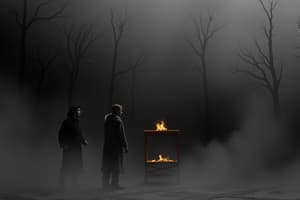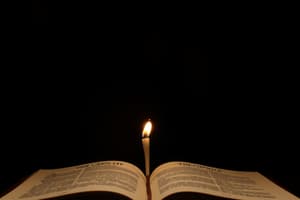Podcast
Questions and Answers
What is the primary reason Sarah Good is accused of witchcraft?
What is the primary reason Sarah Good is accused of witchcraft?
- She confessed to being a witch.
- She could not recite the ten commandments. (correct)
- She is pregnant and therefore immune.
- She is linked to the death of Goody Putnam's babies.
What motivation does Proctor express when he claims to have promised something to 'that girl'?
What motivation does Proctor express when he claims to have promised something to 'that girl'?
- To ensure his family's safety.
- To defend Elizabeth's honor.
- To highlight his loyalty to the court.
- To imply manipulation by Abigail. (correct)
What impact does the fear of witchcraft have on the court's decisions?
What impact does the fear of witchcraft have on the court's decisions?
- It causes the court to base decisions solely on personal vendettas. (correct)
- It leads to a more rigorous defense for the accused.
- It results in a decrease in the number of accusations.
- It encourages a thorough investigation into each case.
How does Hale's visit to the Proctor home reflect religious influence in the community?
How does Hale's visit to the Proctor home reflect religious influence in the community?
What theme is illustrated by the fact that 39 people were accused of witchcraft?
What theme is illustrated by the fact that 39 people were accused of witchcraft?
What motivates Cheever's actions when he visits the Proctor's house?
What motivates Cheever's actions when he visits the Proctor's house?
Which piece of evidence plays a crucial role in Elizabeth's arrest?
Which piece of evidence plays a crucial role in Elizabeth's arrest?
How does fear influence the decisions of the characters in the story?
How does fear influence the decisions of the characters in the story?
What religious influence impacts the characters’ beliefs during the trials?
What religious influence impacts the characters’ beliefs during the trials?
In the context of the trials, how is the theme of accusation depicted?
In the context of the trials, how is the theme of accusation depicted?
What does John Proctor's character reveal about the motivations behind his actions?
What does John Proctor's character reveal about the motivations behind his actions?
What threat does Abigail pose to John Proctor if he attempts to discredit her?
What threat does Abigail pose to John Proctor if he attempts to discredit her?
Which character shows a reluctance to testify about the doll due to fear?
Which character shows a reluctance to testify about the doll due to fear?
What motivates Elizabeth Proctor to ask John to go to Salem?
What motivates Elizabeth Proctor to ask John to go to Salem?
Which action shows John Proctor's internal conflict regarding Abigail?
Which action shows John Proctor's internal conflict regarding Abigail?
What method does the court use as evidence against Sarah Good?
What method does the court use as evidence against Sarah Good?
How does Abigail’s motivation stem from fear?
How does Abigail’s motivation stem from fear?
What religious influence is evident in the Proctor household?
What religious influence is evident in the Proctor household?
Why is Rebecca Nurse's arrest significant in the context of accusations?
Why is Rebecca Nurse's arrest significant in the context of accusations?
What is the underlying theme of accusation as portrayed in the play?
What is the underlying theme of accusation as portrayed in the play?
How does John Proctor's view on the witch trials evolve throughout the act?
How does John Proctor's view on the witch trials evolve throughout the act?
Flashcards
John Proctor's inner conflict
John Proctor's inner conflict
John Proctor's hesitancy to confront Abigail stems from his past feelings for her, creating an internal conflict.
Mary Warren's disobedience
Mary Warren's disobedience
Mary Warren, the Proctor's servant, attends court against their wishes, causing tension and revealing her involvement in the court proceedings.
Elizabeth's suspicion of John
Elizabeth's suspicion of John
Elizabeth's suspicion of John arises from her learning that he was alone with Abigail, highlighting the escalating distrust and suspicion.
The significance of the poppet
The significance of the poppet
Signup and view all the flashcards
Sarah Good's accusations
Sarah Good's accusations
Signup and view all the flashcards
Abigail's motive for framing Elizabeth
Abigail's motive for framing Elizabeth
Signup and view all the flashcards
Reverend Hale's investigation
Reverend Hale's investigation
Signup and view all the flashcards
The Proctors' unorthodoxy
The Proctors' unorthodoxy
Signup and view all the flashcards
Rebecca Nurse's arrest
Rebecca Nurse's arrest
Signup and view all the flashcards
The growing witch hunt
The growing witch hunt
Signup and view all the flashcards
Cheever's arrival
Cheever's arrival
Signup and view all the flashcards
Mary Warren's fear
Mary Warren's fear
Signup and view all the flashcards
The context of fear and vengeance
The context of fear and vengeance
Signup and view all the flashcards
John Proctor's confession
John Proctor's confession
Signup and view all the flashcards
Reverend Hale's motives
Reverend Hale's motives
Signup and view all the flashcards
The court's authority
The court's authority
Signup and view all the flashcards
Questioning the accusations
Questioning the accusations
Signup and view all the flashcards
Mary Warren's involvement in court
Mary Warren's involvement in court
Signup and view all the flashcards
Abigail Williams's role
Abigail Williams's role
Signup and view all the flashcards
Elizabeth's arrest
Elizabeth's arrest
Signup and view all the flashcards
Deterioration of morality
Deterioration of morality
Signup and view all the flashcards
Proctor and Abigail's conflict
Proctor and Abigail's conflict
Signup and view all the flashcards
Rapid escalation of hysteria
Rapid escalation of hysteria
Signup and view all the flashcards
Study Notes
The Crucible - Act II Key Points
- Elizabeth Proctor asks John to go to Salem to expose Abigail Williams as a liar.
- John Proctor hesitates to confront Abigail due to lingering feelings for her.
- Mary Warren, their servant, upsets the Proctors by disobeying them and attending court.
- Elizabeth is suspicious of John after learning he was alone with Abigail.
- Mary gives Elizabeth a poppet, which plays a crucial role in Elizabeth's later arrest.
- Numerous accusations arise, with Sarah Good facing charges for witchcraft due to her behavior and inability to recite the commandments.
- Elizabeth believes Abigail wants to kill her to replace her as John's wife.
- Reverend Hale visits the Proctor household to investigate their Christian values and family suspicions.
- Proctor's family is viewed as suspicious by the court for not attending church and the unbaptized child.
- Rebecca Nurse is arrested for the murder of Goody Putnam's babies, indicative of the widespread hysteria.
- The number of accused witches rises dramatically, evidencing societal panic.
- Cheever arrives to search the Proctor home, representing increased court authority and paranoia.
- Mary Warren fears testing the truth in court, aware of Abby’s influence and potential retribution.
- The context of Salem's fear and vengeance drives the narrative, where personal grudges are masked as accusations of witchcraft.
Character Quotes and Context
- John Proctor: "I wilted, and, like a Christian, I confessed" shows the struggle with guilt and societal pressure.
- Hale: "I come of my own, without the court's authority" speaks to his initial intent to find the truth.
- Cheever: "The court bid me search your house" highlights the invasive nature of the court during this period.
- Proctor: "Is the accuser always holy now?" questions the integrity of the accusatory system in Salem.
- Mary Warren: "I made it in the court, sir, and---give it to Goody Proctor tonight" displays her involvement in the court proceedings that has unintended consequences.
Accusations and Arrests
- Abigail is central to creating chaos, using her influence to accuse others.
- Elizabeth's arrest is fueled by the poppet incident and Abby's manipulations.
- The community's moral fabric deteriorates as paranoia leads to wrongful accusations.
- Proctor's tension with Abigail emphasizes the personal stakes amidst the broader witch hunt.
Other Observations
- The narrative occurs eight days after the initial witch accusations, leading to a spike in hysteria.
- Sarah Good is portrayed as an unlikely scapegoat due to her age and circumstances.
- The systematic arrests reflect the precarious nature of reputation and fear in Salem.
This summary outlines the main events and character motivations in Act II of The Crucible, capturing the essence of the societal turmoil and the personal conflicts among the characters.
Studying That Suits You
Use AI to generate personalized quizzes and flashcards to suit your learning preferences.




